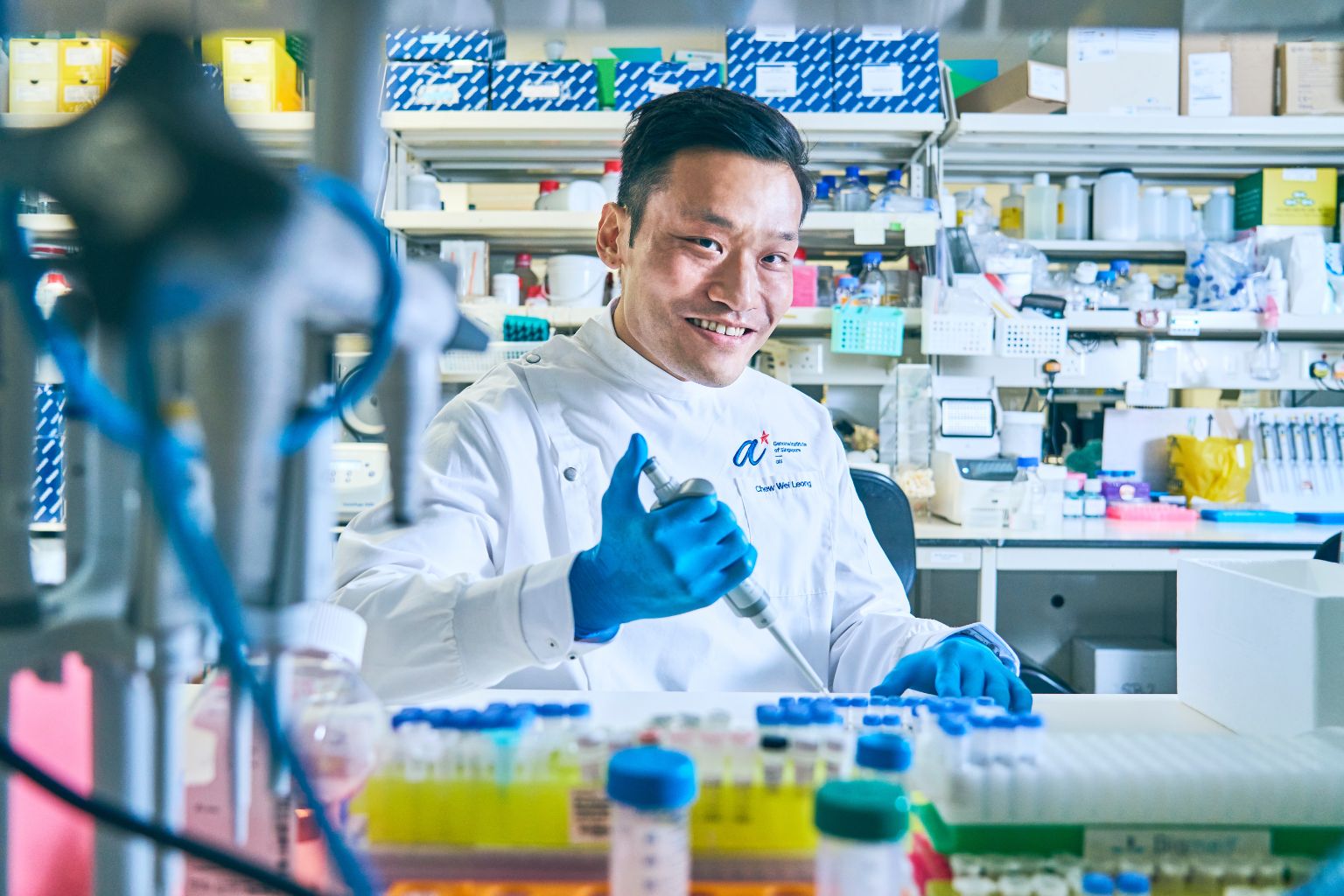
Microscopes, petri dishes and cutting-edge equipment fill Chew Wei Leong’s work environment. It is where the next medical breakthrough for mankind awaits discovery.
“Great technology is like magic: You are surprised by how it effortlessly solves a problem, seemingly beyond the realm of possibility. Everything you touch and see that isn’t from the Stone Age was developed by science and technology, which have changed and improved our lives in pervasive – and magical – ways,” he says.
“But beneath its simplicity lies a tapestry of human knowledge, innovations and breakthroughs that create this very sense of wonder together.”
Since primary school, he has been fascinated with the world of science. He would spend hours at the neighbourhood library by himself, poring through pictorial books that depict chemical reactions, slime, dinosaurs, plants, gadgets and technology – topics that now fascinate his two young children.
“There were new things to learn, like the laws of physics, strange creatures, how different societies embrace technology and how technology has made our lives so different from decades ago. There is this pleasure of finding things out,” he says.
Wei Leong excelled academically through junior college and always knew he would pursue something related to science. Unlike many of his peers who had travelled extensively, he saw the Agency for Science, Technology and Research (A*STAR) National Science Scholarship (BS-PhD) as an opportunity not just to pursue meaningful scientific work, but also to experience life beyond Singapore’s shores.
“If you are passionate about science, technology development and commercialisation, and like to pursue research, the A*STAR scholarship is a no-brainer as it gets you experiences in the best research institutions, support from an established scholarship team, and the pathway to contribute to Singapore’s next phase in building a high-tech nation,” he says.
Under the scholarship, Wei Leong pursued a bachelor of science at Duke University and acquired a doctor of philosophy (PhD) in biological and biomedical sciences at Harvard University, both in the United States.
The scholarship allowed him to skip a master’s programme in between. Before heading to Harvard, he returned to Singapore after his undergraduate studies for a year of research at an A*STAR laboratory. This arrangement allowed him to “develop the very tangible lab skills that PhD institutions look out for”, says Wei Leong.
“A*STAR helps to build the scientist from the start of one’s undergraduate studies, which is uncommon.”
“Great technology is like magic… Beneath its simplicity lies a tapestry of human knowledge, innovations and breakthroughs that create this very sense of wonder together.”
– Chew Wei Leong, recipient of the A*STAR National Science Scholarship (BS-PhD)
He adds that a PhD in science opens up multiple avenues for future careers and passions: His peers have gone on to create biotech start-ups, conduct exciting research in academic institutions and join the venture capital investment sector.
The 39-year-old is now a senior principal scientist and associate director at the Genome Institute of Singapore. The public sector agency, known for bridging the gap between academia and industry through open innovation, commits itself to advancing scientific discovery and transforming research into tangible solutions to improve lives.
At A*STAR, he leads a team of scientists, manages research labs and develops biomedical solutions that can potentially cure diseases that are currently untreatable. His ultimate goal is to create “a world without diseases for our children, family, friends and people in Singapore”.
He laughs off the misconception that scientists are always holed up in the laboratories, peering into microscopes alone. In his job, Wei Leong also constantly meets other scientists for discussions and works with Singapore’s Bioethics Advisory Committee and public outreach organisations to learn how his work can affect people from all walks of life.
A few years ago, he was part of the team that invented the CRISPR-based C-to-G Base Editor, a ground-breaking gene-editing technology that he continues to work on today. CRISPR stands for “Clustered Regularly Interspaced Short Palindromic Repeats”.
This medical technology “edits” disease-causing mutations in our deoxyribonucleic acid (DNA) into healthy versions so that genetic diseases – including cystic fibrosis, neurological disorders and blood disorders as well as cardiovascular and musculoskeletal diseases – can be treated more readily.
Or, as Wei Leong puts it: “Imagine being able to modify your genetics – making precise changes to help improve that individual’s quality of life. About 10 to 15 years ago, making targeted edits to genetic material wasn’t this straightforward.
“You get a sense that this is big and that it will impact human society for a very long time.”
In the future, he hopes that his lab’s continuing breakthroughs in DNA- and ribonucleic acid (RNA)-editing technology can help medical professionals to cure and correct genetic diseases at their root causes, and not just alleviate their symptoms.
His idea of a future utopia is to cure diseases that are currently “devastating but will only be mild annoyances in the future” with a simple injection at your local doctor’s clinic.
Although he has been at A*STAR since 2016 and has long finished his bond, Wei Leong says he is still with the agency because of the opportunities to pursue independent research that aligns with what society values and needs. He also enjoys mentoring and working with “many people of immense intellect”.
“We derive a lot of meaning in what we do. It cycles back to the childhood fascination of being able to freely pursue interesting things,” he says.
“Here, you can recreate this while also contributing to impactful science. Remember the times when you are observing something for the first time in human history? That feeling is magical.”